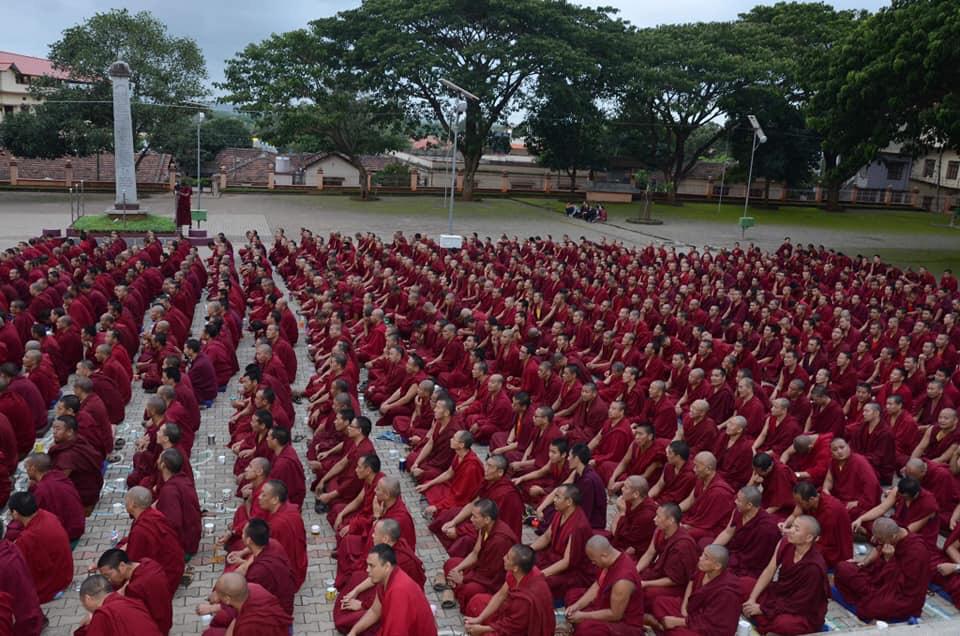

By clicking Sign Up you’re confirming that you agree with our Terms and Conditions.
Sera Jey Monastery follows its centuries old tradition and culture dating back to its great period in Tibet, to this present day without much significant change. As such the monastery continues to exist in a typical Tibetan Gelukpa monastic tradition to this day.
The monastery’s organization is well organized into two separate streams, one involved in Spiritual / Educational Administration and the other in General / Financial Administration.
Structure:
Spiritual / Educational Administration
The Spiritual Administration is associated on all spiritual affairs, prayer / puja curriculum and academic course / examination
The monastery’s abbot (Khenpo) is the spiritual head monk of the monastery and also the chairman of the institute as a whole.
General Administration
The General administration manages the general and financial affairs of the monastery.
An Administration Committee, referred as chanzo-khang in Tibetan, comprising of 5 members appointed by the governing body for a term of three years, manages the entire General Administration work. The Committee will be led by one of the five appointed members as the Chief Administrator / Secretary.
A team of appointed staffs assists in the general administration work.
Khenpo (Abbot)
Khenpo (Abbot) is the Chief Priest and Chairman of the Monastery.
He is appointed for a term of seven years, by a particular system prevailing in the Monastic tradition. His appointment is preceded by a formal & characteristic monastic system, where some (about 5 in no) of the most eligible senior & learned monks of the Monastery are short-listed by the General Board Members. These short-listed candidates are forwarded to His Holiness The Dalai Lama, who will select one likely candidate. The selected candidate will henceforth take the Abbotship of the Monastery for the full service term of 7 years.
However His Holiness The Dalai Lama can recommend in the extension or acceptance of resignation of the Abbot’s term of office.
Ghe-gheu: (Disciplinarian / Dean)
Ghe-gheu in English means – Disciplinarian. He is considered the Dean of the institute, but with a greater responsibility over wide range of monastic affairs – supervision in overall disciplines – monastic discipline, Academic Course, Curriculum schedules, Examination, Assembly Prayers…etc.
He is elected for a term of 1 year. The General Board Members of the Monastery through a process of election short-list a couple of candidates who fit best for the post of Disciplinarian. And from this short-listed candidate a general election by the masses (member monks) will take place to elect one candidate for the post of Disciplinarian.
The new Disciplinarian (Dean) takes charge of the responsibility during the day of Ngamchoe (Lama Tsong Khapa day) 25th day of 10th Tibetan Calendar Month.
He is assisted by 2 deputies called – Chapre, who are voted through general election by the sanga assembly.
Committee For Sera Jey Philosophical Studies & Board of Examination –
The committee is responsible for the administration of Monastic University Course, and holds a similar responsibility that of a modern Academic University Department. The Committee manages the day-to-day Debate class schedules and maintains attendance register, sets question papers and conducts examination, valuates examination answers and reviews course syllabus. The committee in consultation with the Advisory Committee, the Disciplinarian (Dean) and the Abbot in particular, can make amendments to certain aspects of Monastic University Department.
The Committee consists of five member Directors, elected in two alternate batches with a service term of 3 years.
Advisory Committee For Sera Jey Philosophical Studies:
The Committee comprises of senior most members of the monastery – all former Khenpos (ex Abbots), Ghe-gheus (ex – Disciplinarians / Deans) with current Directors of Committee for Philosophical Studies.
The Advisory Committee provides guides and recommendations on the functioning and administration of the Monastic University Faculty.
General Administration
The General administration manages the general and financial affairs of the monastery.
An Administration Committee, referred as chanzo-khang in Tibetan, comprising of 5 members appointed by the governing body for a term of three years, manages the entire General Administration work. The Committee will be led by one of the five appointed members as the Chief Administrator / Secretary.
A team of appointed staffs assists in the general administration work.

